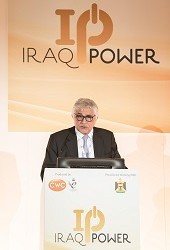
Iraq’s electricity generation needs urgent fuel supply
London: Iraq’s electricity shortages cannot be resolved unless sufficient fuel flows to the power plants feeding Iraq’s national grid, according to Dr Jafar D. Jafar, co-founder and CEO of Uruk Engineering & Contracting. He addressed an audience of leading energy sector decision-makers about the “Gas Challenge for Iraq’s Power Sector” at the Iraq Power and Iraq Petroleum conferences held recently.
Uruk’s CEO highlighted the short-fall in fuel availability, particularly gas, currently impacting Iraq’s power generation capacity. He noted that the current gas fuel shortage has decreased Iraq’s power availability on the national grid by at least 3000 MW. Major Power plants such as Nainawa (6×125 MW), Al-Mansurya (4×182 MW) and Rumaila (5×290 MW) are idle because of lack of fuel. The irony is that Iraq is currently flaring more than 900 million standard cubic feet per day of associated gas in the South whereas major power plants are shut down because of lack of gas. Peak power supplied from Iraq’s national grid has exceeded 12,000 MW and electricity peak demand is estimated at 16,000 MW. Therefore, these currently idle power plants would go a long way towards reducing black outs during the long Summer months.
Dr. Jafar also noted that gas as a fuel for power generation is the best choice when compared with liquid fuel options such as light distillate or diesel, crude oil or heavy fuel oil (HFO). Gas is best from the environmental view point and from every other standpoint. For example, power plants operating on gas require the least maintenance and provide the highest availability when compared with power plants operating on liquid fuels.
Ensuring Iraq’s long- term electricity security will require a number of bold and aggressive steps to be taken not only by the government; but also by the international oil companies (IOCs) that have development contracts in the country. The power industry expert’s recommendations include converting most existing gas turbine (GT) open cycle power plants to combined cycle, a move that will increase fuel utilization efficiency by up to 50%; and such a move could add more than 4000 MW to the national grid at no extra fuel cost to the nation.
In the short term, the former Chairman of the Iraqi National Committee for Technology encouraged the Ministry of Oil to follow up aggressively with IOCs to treat and pipe natural gas from natural gas fields, such Mansurya and Akkaz, urgently.
Operational improvements are also required within Iraq in order to reduce electricity transmission and distribution losses, which currently stand at around 28%. These losses should be reduced to not more than 10%. The planned introduction of smart energy consumption metering should contribute to a substantial reduction in these losses. Moreover, increasing the electricity tariff from the current average of 1.7 USD cents per kWh to circa 4 USD cents per kWh should balance supply/demand even at current supply levels.
Despite the frenetic political situation in Iraq, Dr. Jafar advised those responsible for providing fuel and electricity to expedite anti-corruption measures and facilitate the provision of gas to idle power plants as a national priority.
Dr. Jafar spoke during a session entitled “Fostering Market Trends in Iraq’s Power Generation Projects”. Professor Dr. Friedbert Pflüger, Director of the European Centre for Energy & Resource Security chaired the session.
End.